#palomides
Text

he takes requests
[link to GRADALIS]
#gradalis#gradalis palamedes#gradalis dinadan#arthuriana#palomides#dinadan#i did it again i accidentally deleted the post istg#kochei doodles
153 notes
·
View notes
Note
tristan/isolde/palomides your MIND
LISTEN I have so many thoughts about them!! It’s an actual tragedy that they’ve never inhabited a movie together. I first noticed them in Le Morte d'Arthur, as I'm sure most people did, as it's more accessible than the Prose Tristan. But I didn't really appreciate them until after I read Between Knights: Triangular Desire and Sir Palomides by Oldga Burakov Mongan. In this essay, Mongan claims:
Very often the bond between the desiring subject [Palomides] and his beloved [Isolde] is peripheral, subordinate in its intensity, to the subject's relationship with his male 'mediator of desire' [Tristan].
This essay breaks down many of the encounters between these three in Le Morte and demonstrates how interconnected they truly are. Speaking for myself, I prefer La Tavola Ritonda instead. I'm not quite done scanning that, but it will be on my blog ASAP.
In the mean time, it has one of my favorite Palomides introductions ever.
There entered on the side of the King of Scozia a knight who bore all black insignia, and who was called Palamidesso the Pagan, a son of King Scalabrino. This Palamidesso carried two swords by his side as a signal that no knight had ever made him bend over the saddlebow.
Duel wielding? Bend over the saddlebow, you say? Interesting. Palomides goes on to win this tournament! After that he follows his lord to another castle where he first sees Isolde, falls in love with her, and begins a hateful staring contest with Tristan (literally). It's here that they battle for the first time...
As Tristano looked over the field, he saw that Sir Palamidesso was leaving, and called out to him, "Hallo, knight, guard yourself against me! I am the knight you met at King Languis' court, and it seems now that I am the worthier of the love of Isotta the Blonde!"
Bold Palamidesso, hearing those words, turned his horse's head around and, drawing his sword, gave Tristano such blows on his helmet that he bent him over the saddlebow. But Tristano hit back, and hit Palamidesso so hard on his helmet that he made blood gush out of his mouth and nose, and knocked him off his horse so badly wounded that for a long time he was unconscious. Thus Palamidesso lost the prize, and lost also the right to wear two swords.
Compelling word choice throughout this. Anyway as per usual they continue to squabble until eventually settling their differences and becoming friends (in part thanks to Lancelot who apparently rents out his castle for polyamorous hookups).
"When I was jousting with Sir Lancilotto the other day, he said to me, 'Now, Palamidesso, Gioiosa Guardia is worth more than any other place in the world, for it holds a noble treasure.' Therefore I imagine that this treasure is Sir Tristan and the beautiful Isotta, because those two are the ones who excel all others in the world in beauty, prowess, and courtesy."
When he heard these words, Tristano allowed Palamidesso to remount and then let his lance fall, since Palamidesso had broken his. Then he spoke in this way: "Palamidesso, Palamidesso, here is this Tristano you have been searching for. Come and fight me, if you want to. If not, I am willing to stop because of those words you spoke. I am your enemy, but I am ready to make peace with you. Still, if it would please you to fight, I am ready to do battle with you. You may choose whichever pleases and delights you most."
Palamidesso replied, "Surely, Tristano, the man who could have you for a friend would be foolish to want you for an enemy, Therefore I ask that there be peace and good friendship between us."
Nobody tell Palomides that Lancelot was almost certainly referring to Guinevere and not Tristan or Isolde. But their truce culminates in everyone joining back up at Cuck Castle Joyous Guard.
The knights then rode in that direction, and when they arrived at the main palace they found the lady, Queen Isotta, all happy and joyous, attended by ladies and maidens. When Tristano told her how he and Palamidesso had made peace, she was very glad of it, and welcomed the knights with much honor. Then the tables were set out, and they all sat down to eat.
Much later, King Arthur hosts a joust in which all participants are to bring a lady. So, now that everyone are friends, Isolde is brought along with a retinue of knights, including Tristan and Palomides. They wear her colors and fight on "her" side against Arthur, Lancelot, and their kinsmen on Guinevere's "side." Polyamory enjoyers, this text is for us. Anyway the only portion of that I'll include is this sweet passage which really illustrates that the friendship in this little group is genuine. They're all affectionate after the truce and everyone is having a great time.
When Isotta had returned to the pavilion, the tables were set out and food was prepared, and when water had been brought out for their hands, they sat down to eat. As they ate, Gariette looked out and saw Palamidesso going by looking for them, and pointed him out to Sir Tristano. Tristano got up and went to meet him, taking him by the hand and leading him into the pavilion, where he disarmed and sat at the table. They all passed that night in great joy.
After this, they all live happily ever after, and nothing bad happens. :'^) I'll have La Tavola Ritonda done soon, and then you all can enjoy it too. I promise it's worth getting used to the Italian names, it's so fun! Thanks for the ask!
#arthurian legend#arthuriana#arthurian mythology#arthurian legends#arthurian literature#tristan#sir tristan#isolde#queen isolde#palomides#sir palomides#palamedes#sir palamedes#le morte d'arthur#sir thomas malory#la tavola ritonda#tristan and the round table#quotes#ask#anonymous
23 notes
·
View notes
Conversation
Dinadan: It's valentine's day, so I sent a box of chocolates to the hottest guy at the round table.
Palomides: The note you left on it just said 'to the hottest guy at the round table.'
Dinadan: I know. I didn't have anyone specific in mind, but now they're all fighting over who's the hottest and I get to watch.
27 notes
·
View notes
Text
Pellinore: You’re like the son I never had.
Palomides: You have four sons.
Pellinore: oh right…
#shoulderangelcomics#arthuriana#incorrect arthurian quotes#king pellinore#Pellinore#sir palomides#the brain decided to flesh out pellinore and palomides’a relationship#Palomides
14 notes
·
View notes
Text
King Arthur: None of the kings are allowed to participate in the tournament joust. Those are the rules.
King Arthur, after he saw all his Knights defeated in the joust:

King of Northanglis, after seeing his fave Knights (Palomides and co.) defeated by Arthur and co.:

THIS IS ANARCHY, YOUR HONOR.
#arthuriana#le morte d'arthur#king arthur#tristam#palomides#heli blobbing#it's a lawless game#cant tthey just go to war like normal men
7 notes
·
View notes
Text
Galehaut (accidentally) kills Palamedes's horse
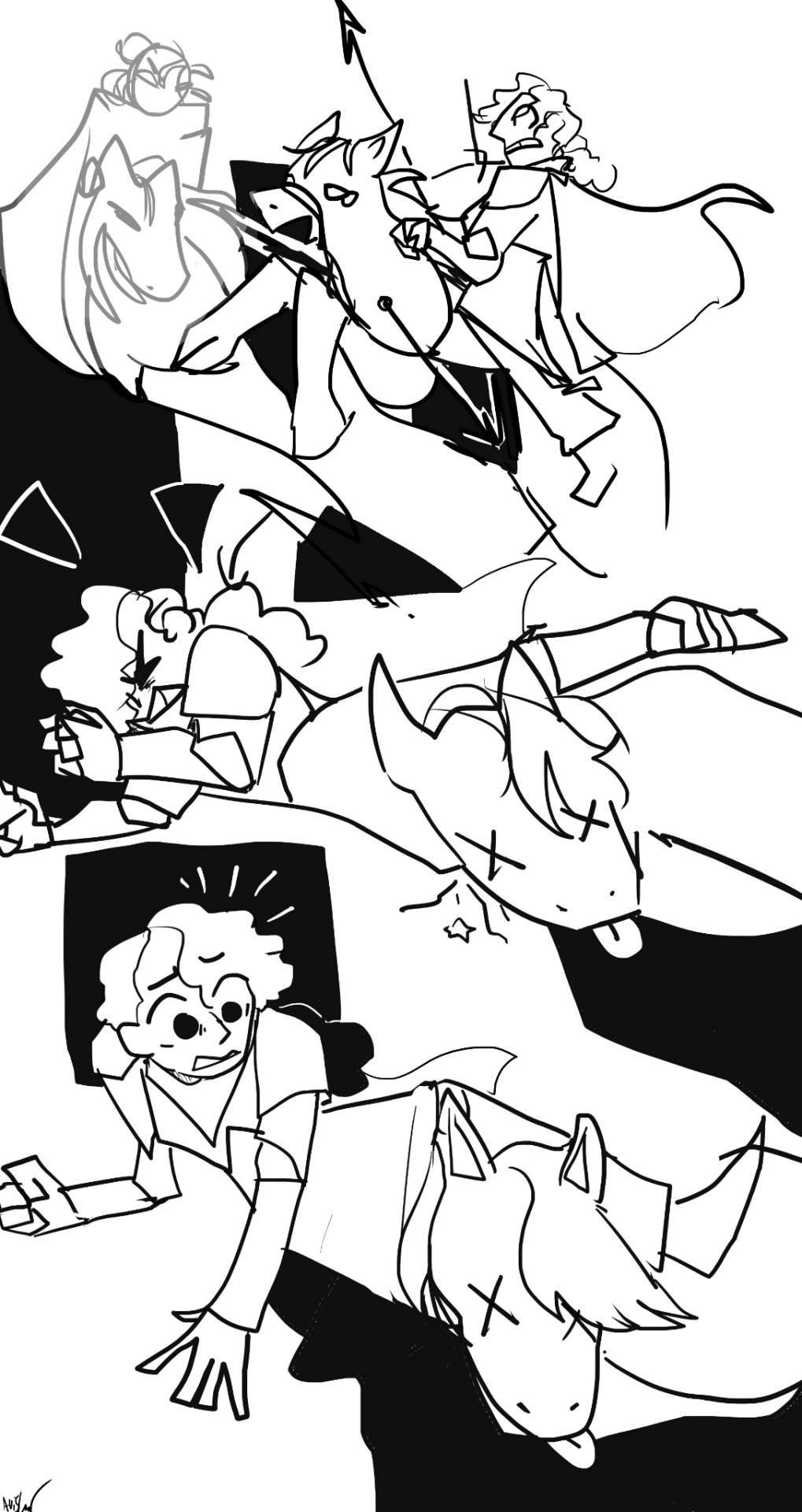

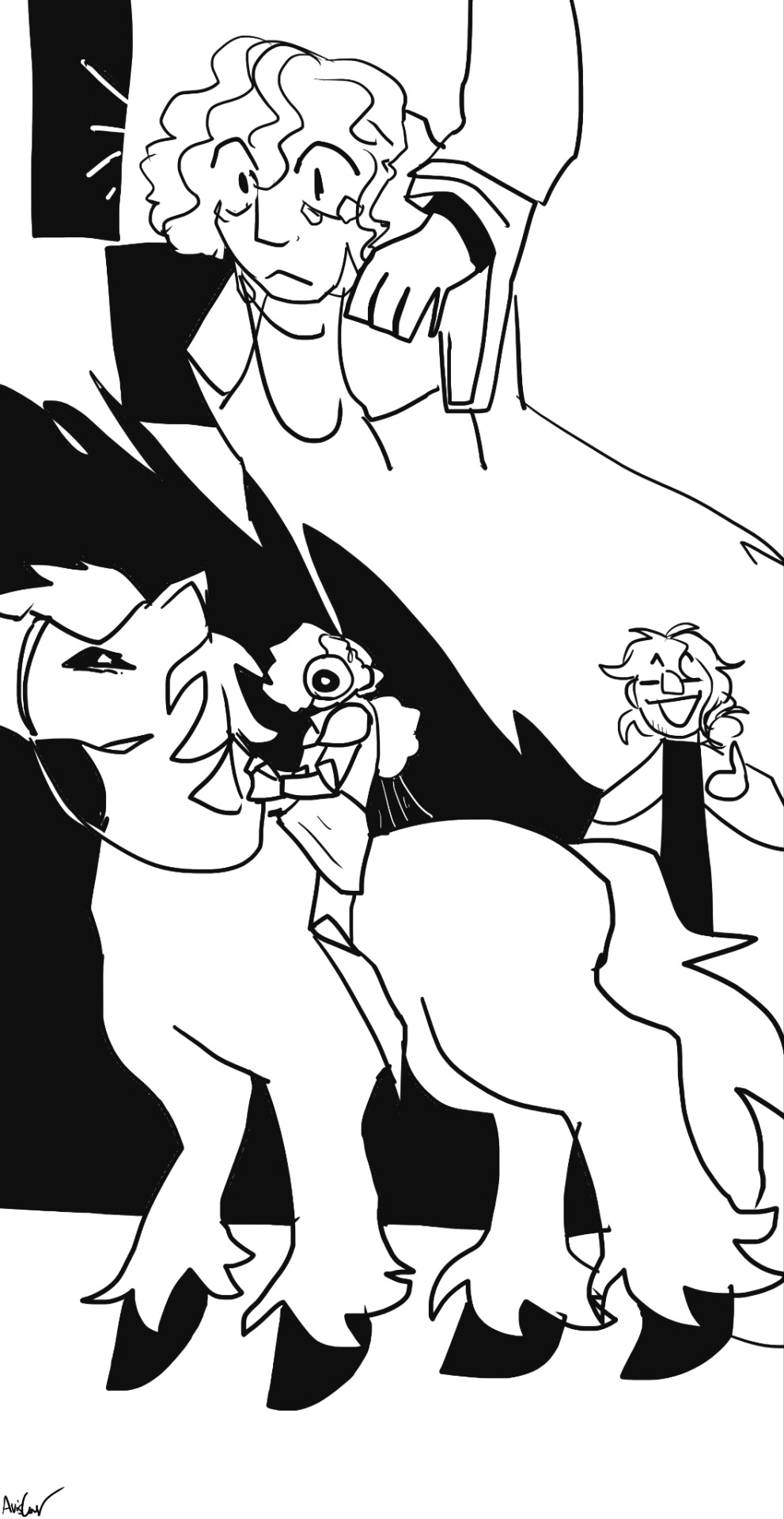
#arthuriana#art#my art#arthurian legend#avis's doodles#palomedes#palomides#palamedes#galehaut#animal death
22 notes
·
View notes
Text

Reading this makes me so angry. Palomides, my bro. This man has beat you up, threatened to murder you, and publicly humiliated you hours after finding out that you were suicidal from all the other times that he publicly humiliated you. He has only ever been nice to you when he needed you or as some weird, sadistic power play. You hating him is a perfectly reasonable reaction to the fact that he is a terrible person. So you will please
STOP!
SUCKING!
THIS!
BASTARD'S!
DICK?!
#Arthurian legend#Arthurian mythology#Tristan and Isolde#Tristan and Iseult#Le Morte D'Arthur#Palomides#Palamedes#Tristram#Sir Tristan#Sir Tristram
7 notes
·
View notes
Text
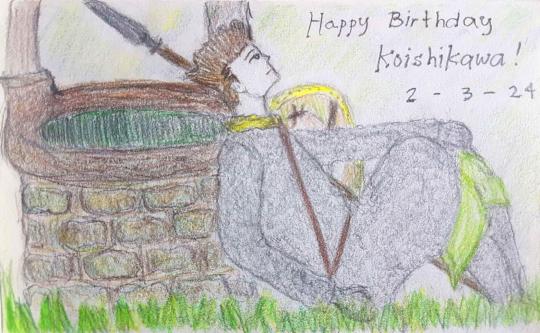
I was thinking "What would I do for Koishikawa's birthday this year?" And you know what?
Here's Koishikawa Kenjirou as Sir Palomides from Le Morte d'Arthur.
Sir Palomides in Thomas Malory tradition always have his emotional episodes near wells…wells have water…Koishikawa is an aquarius… aquuarius is… water carrier. Well you get the gist.
There's logic behind it i swear. XD
Anyway this was fun.
1 note
·
View note
Text
Reading the Stanzaic Morte Arthur after Malory and it’s got me thinking: the trial where Gwen needs a night to fight for her. Lancelot’s unavailable and in Stanzaic we get a reason for every knight who doesn’t pick up the fight for him who could win it for her, and it’s got me wondering why we didn’t get that in Malory. Sure Lancelot’s nephew Bors takes it up for him, but like, there could have been more debate. Because logically it should have been Palomedes. Since he’s fourth, but the three above him are either dead or Lancelot. Plus he’s got this thing about helping maidens and fighting for them if they need it, and he’s not at the banquet that convinced everyone she’s guilty (no Malory, Priamus is not Palomedes)
Anyways where’s my Palomedes tries to fill in for Lancelot as the Gwen’s proxy in trial by combat.
#Stanzaic Morte Arthur#king arthur#Arthuriana#sir thomas malory#le morte d'arthur#guenievre#lancelot du lac#Palomides#Palomedes#I know he’s probably like#out chasing the questing beast#but it would have been cool
2 notes
·
View notes
Text
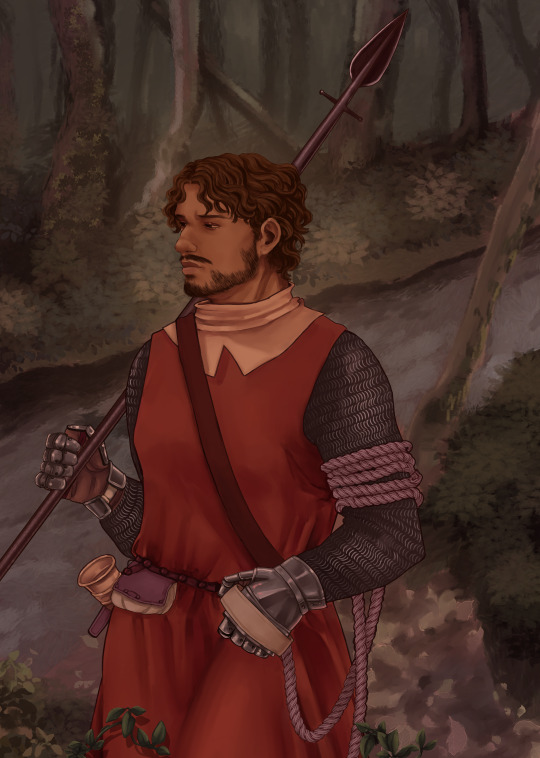
palamedes on the hunt for the questing beast
155 notes
·
View notes
Note
Hi! I hope I do not bother you, but I'd like to ask a thing (if you already answered this in another ask I'm sorry) because you seem to be the most qualified person to answer. In a retelling, when how much is too much changing? I am writing two whole Arthurian fics and while I mostly mix and match from different versions there are some things I fully changed (one of the most egregious, for example, being Palamedes dying early in Post-Vulgate fashion and Safir as the one who slays the Questing Beast and the killing being an expression of vengeance instead of newly-found peace despite this definetely not being the case in the original text). I think what I changed works better for plot reasons but I am a bit uncomfortable with it, especially when it comes to characterization. But on the other hand there are so many different versions that I find it hard to say if I am ruining it or not because even in the canon plots and characters' personalities change a lot but I don't want to do something that ends up being "in name only". When is too much too much?
Hello! I don't know about being the most qualified person to answer, but I can certainly give you my answer! I've explained this a little bit before here and here, but can elaborate again for you, especially because I think those characters and that text in particular should be handled with care.
Before you determine what amount of reinterpretation constitutes the right balance, pause everything, and pinpoint your audience. Are you writing fanfiction for your own self-fulfillment and enjoyment? Maybe also for a handful of friends who share your ideas? In that case, there are no rules, do whatever you want. That's your space, your story, and you bear no responsibility to uphold some unquantifiable standard of characterization "accuracy." Fandom is your sandbox and you can build whatever castle you want! Be free!
The next thing to determine is what characters you're changing and why. Not all changes are created equal! For example, if you wanted to absolve Arthur of the May Day Massacre to write a more honorable King, it's not all that drastic a change. There are many texts, old and new, in which that narrative beat never occurs. If noble Arthur serves your story better than morally gray or evil Arthur, and it can be done without compromising the Arthurian fabric from which you sample, go for it. Alternatively, if you decided to incorporate additional violence into the story, especially if attributed to a character who had not previously done those things (such as rapist Gawain, ie, inverting his Maiden's Knight role he's known for), you're going to have a harder time selling the reader on it. Generally speaking, a positive or neutral change will always be easier to sell than a negative one.
This is especially important if you intend to publish something you write for a broader audience. That's a different matter, in my opinion. In that regard, the thing you create is contributing to an Arthurian body of work that's meant to stand on its own. Fanfiction exists in a writing niche which assumes a base knowledge from the reader, you may not necessarily explain what Camelot is, or what chivalry means, or who Palomides is. That's fine and dandy. It's for fun!
But with a published book standing alone on the shelf, the author is expected to establish the framework of the world their story takes place in. That may or may not align with "canon" and therefore maintain or depart from the expected. This is where your decisions as an author matter. While Arthuriana is anachronistic by design as a literary tradition that's evolved alongside its authors, the moment you decide on an era to write in (if you put a year to it or imply one based on what historical aspects emerge), you now bear responsibility to depict that as accurately as you can. Even if it's a mishmash of "Medieval" spanning a few centuries, it should still bare resemblance to the era. Particularly in our current political climate with constant misinformation and even disinformation spreading, it's important to do the research necessary to create something genuine so as to avoid misrepresenting the past and the people in it. For example I think it would do a disservice to an Arthurian story to ignore religion, particularly one about Palomides or his brother Safir. To write them as areligious is to ignore the role in the Arthurian narrative they were created for. They're Saracen, (even if Palomides converts in some versions), and to ignore the way religion and race interconnect in Medieval society would be disingenuous.

[Idols in the East: The Saracen Body by Suzanne Conklin Akbari]
And, more to your point, that aspect informs character. The stories define Palomides by his religion, by his race, and how that impacts him in the face of a rivalry with Tristan, a white Christian, for the love of Isolde, another white Christian. This isn't to say that you're obligated to depict racism, or to put the characters into situations that oppress and hurt them, but to write something "race blind" is to erase the character's identity, and that would be too great a change, for me personally, to get by.
That being said, if you're writing in 6th century Britain, your research might lead you to think, "Hey wait a minute, Islam doesn't exist yet! But Palomides and Safir are written as Muslims, so how can I stay true to both the era I'm writing in and the characters if that anachronism is built right in?" Well, that's where you have wiggle room to be creative! Perhaps they're Zoroastrians or follow one of the many Berber religions that existed at the time. Even Tristan could reasonably be written Pagan in this era, as he has in many retellings before you sent this ask. Maybe Tristan's Mithraic or Druid or Jewish and that in and of itself helps mitigate some of the tension between the characters as neither are Christian. All of this should be handled with great care, of course, but the point is that there aren't really straight answers about what changes are worth making.
Your discomfort in this isn't unjustified. I've been there. But it doesn't mean you're doing anything "wrong." It's not a crime to conceptualize changes. I had a lot of anxiety writing Ragnelle and her brother Gromer as Zoroastrians. But I went on to find an editor who studied the religion, and asked my Zoroastrian mutual for help, who put me in touch with a practitioner that agreed to beta read my books and inform me on my handling of it. There's no perfect story, but all you can do is give it your best effort.
I don't think it'll benefit you to worry about "ruining" the story with changes such as Safir pursuing the Questing Beast. That sounds awesome! And your plan about vengeance is baked right into the source material, as the Post Vulgate indicates that QB had killed all of Palomides's brothers before he finally defeated her, so your story has some textual basis in a medieval source. (Not that you need it to be "allowed" to write that, but it may help your anxiety to know!)

[Post Vulgate Quest for the Holy Grail: 87. Galahad and Bors Chase the Questing Beast and Meet Palamedes and His Father, Esclabor the Unknown.]
One other thing I'll point out is choosing the language you use matters a lot. You can have some characters behave a certain way toward Palomides or Safir or this "futile" quest that resembles historical prejudice while utilizing word-choice throughout that signals to the reader you, the author, know what you're doing and understand the nuances at play. Reading broadly will help you with this so much. Not just non-fiction for your research, but other Arthurian retellings as well. I personally didn't love Persia Woolley's handling of Palomides in her Guinevere Trilogy. He was referred to as "the Arab" throughout which seemed like a "lesser evil" placeholder for "the Saracen." It's usage acted as a generalized umbrella term to other Palomides and didn't indicate his area of origin beyond constantly reminding the reader that he wasn't white. (Whereas Gawain was "the Orcadian" and Lancelot "the Breton," which differentiated their white cultures from one another while homogenizing Palomides with every other Eastern person in the story as a monoculture.) Furthermore, many characters were afraid of him (I mean literally making the sign of the cross and hiding when he walked in the room), which isn't consistent with a Post-Roman Britain, in which the population would have been mixed. I prefer the handling of Numidian Sagramore in Bernard Cornwell's Warlord Chronicles. Sagramore, as a Black man, is a part of Arthur and co's community, even if the Saxons themselves are unnerved by him. He's respected by the narrative. It's usually better to be specific (Numidian Sagramore versus Arab Palomides) particularly if that character is a minority and the word is leaving the mouth of a white character. This article discusses this aspect at length and really eased my own concerns depicting these characters and doing them justice.

[Saracens and Black Knights by Maghan Keita]
Here's another example of generalized versus specific language.
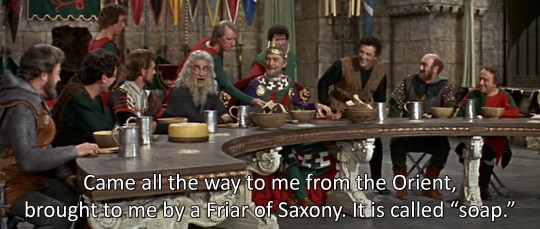
[Sword of Lancelot 1963: Merlin refers to "the Orient."]

[The Adventures of Sir Lancelot 1956: Merlin refers to "the Iberian Peninsula."]
So in my opinion, as long as you don't white wash Palomides or Safir and avoid writing them as "exotic" or "mysterious" or in some way barbaric in the pursuit of the Questing Beast, you're fine. Even in La Tavola Ritonda, Percival pursues QB for a time before Palomides picks up the quest, which is the opposite order in which that occurs in Post Vulgate where Percival and the other grail knights assist Palomides to defeat her at the very end. Many versions don't maintain the incest-monster aspect of QB from Post Vulgate either, like in Perlesvaus or Moriaen, she's just a monstrous creature and that's sufficient to tell the story the author has in mind. Even from a characterization standpoint, Malory wrote Palomides as volatile and melodramatic, having fits in the woods over his grief from which only Tristan could coax him out of, where in La Tavola Ritonda, Palomides is mostly chill and sweet, to the point Dinadan teases him for being a push-over haha! In regards to Safir, there's far less textual source material to base him off of than Palomides, so you have even more creative freedom! Literally the spectrum is so vast you can pretty much characterize however you desire if you keep in mind what the core of the character is and why that's important to their identity and the historical significance of that identity. (Even if it's something you have to bulk up, such as you will for Safir.) If you're ever unsure, it's never a bad idea to ask! Plenty of historians, or medievalists, Arthurian enthusiasts, or people of different cultures would love to discuss this subject. You might have to dig a little, but I can't imagine it'll be harder than my search for a queer Zoroastrian beta reader willing to read a trilogy-length Wedding retelling haha! It'll benefit your writing to submit to the mortifying ordeal of being known so others can give you feedback. Share some passages with a trusted few and gauge their reactions. Read what other people have done and take notes about the way they chose to characterize Palomides or Safir—did [aspect] resonate with you? Or did [aspect] ring false? Exploitative? Hollow? Why? Then step back, take another look, and go from there. It's about vibes and can't be defined, but you'll know when you know.
Hope this helps. Good luck and have a nice day!
#arthurian legend#arthurian legends#arthuriana#arthurian mythology#arthurian literature#palamedes#palomides#sir palamedes#sir palomides#sir safir#the questing beast#questing beast#glatisants#writing#orientalism#racism#history#islamphobia#xenophobia#anti blackness#colorism#ask#anonymous#my post
23 notes
·
View notes
Text
The absolute whiplash of falling in love with Gerald Morris's stern, honorable, music loving Palomides only to read Le Morte d'Arthur and see him be a lovesick fool who commits kidnappings. 3 killed 10 injured.
#palomides#gerald morris#squire's tales#arthuriana#thomas malory#le morte d'arthur#Honestly I love them both#But as VERY different characters#For VERY different reasons
16 notes
·
View notes
Text
i respect one (1) knight in le morte darthur and that knight is sir dinadan
#sir i would die for you#guy really took one look at a castle where to stay there you have to fight and beat two knights#and went no thanks i'd rather look for alternative accommodation#only to be dragged into it by tristram and then manage to gain entry#only to then be told that he has to fight with palomides and gaheris when they come to seek shelter#and turns around to tristram to say look i'm still knackered from fighting thirty knights a few hours ago and the two knights before#i've just been knocked off my horse by palomides#and quite honestly fuck this#(and then proceeds to say that lancelot and his eagerness to fight everyone landed him in bed with injuries for 3 months)#i love him your honour#he's just tired#anyway new blorbo acquired#sir dinadan#le morte d'arthur#le morte darthur#thomas malory#lit reads malory#arthuriana
50 notes
·
View notes
Text
PALOMIDES BRO HOLY SHTTTTTTTT
"By my head," said Sir Palomides, "Sir Tristam is far bigger than Sir Launcelot and the hardier knight. Have ye assayed them both?"
he really thinks tristam is more awesome hahahahhahaha
this is real love, folks... being Tristam's sworn mortal enemy is doing a number on Palomides
#le morte d'arthur#arthuriana#palomides#tristam#sir tristam#sir palomides#tristam x palomdies#heli blobbing#i will go down with this ship
7 notes
·
View notes
